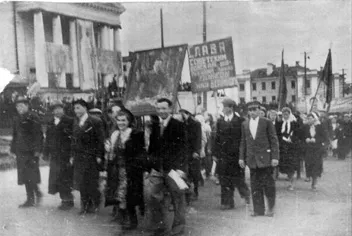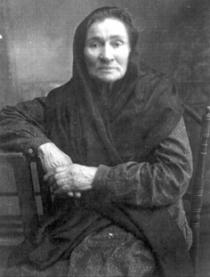Taken on 9 May 1945 at the Victory Day parade in Izevsk. My wife, Rosa Finkler, and I, Leo Lubich, are in the front.
Upon graduation from the Institute in 1939 I worked at the shoe factory in Podol for two years and later I got a job at the military construction department where my brother Jacob worked. He was an economist there. In spring 1941 I met Rosa Finkler at the canteen, a nice Jewish girl. Rosa came from Odessa. She was two years younger than I. She graduated from the Odessa Food Industry Institute and often traveled to the grain elevator in Kiev. Rosa was an only child in the family. Her parents lived in Odessa. They were clerks at an agricultural office. They didn't observe any Jewish traditions. Rosa and I took walks in the parks on the slopes of the Dnieper River, went to theaters, Philharmonic and circus. I am a cheerful man and an optimist always looking at a brighter side of life. Maybe for this reason the war that began on 22 June 1941 was a complete surprise for me. Jacob and I, as well as all other employees of the organization where we worked got a release from the army service in our organization. Uncle Boris, my father's brother living in Izhevsk called us in Kiev right after the war began. I left for Izhevsk by myself. I didn't even have an opportunity to say 'good bye' to Rosa.
Upon graduation from the Institute in 1939 I worked at the shoe factory in Podol for two years. I later got a job at the military construction department where my brother Jacob worked. He was an economist there. In spring 1941, I met Rosa Finkler - a nice Jewish girl - at the canteen. Rosa was from Odessa. She was two years younger than me. She had graduated from the Odessa Food Industry Institute and often traveled to the grain elevator in Kiev. Rosa was an only child. Her parents lived in Odessa. They were clerks at an agricultural office. They didn’t observe any Jewish traditions. Rosa and I took walks in the parks on the bank of the Dnieper River, went to theaters, the philharmonic, and the circus. I am a cheerful man and an optimist - I always looking at the bright side. Maybe it was this optimism that made the arrival of the war on 22 June 1941 such a complete surprise for me. Jacob and I, as well as all our colleagues, got a release from the army service. Uncle Boris, my father’s brother who lived in Izhevsk, called us in Kiev right after the war began. I left for Izhevsk by myself. I didn’t even have the opportunity to say goodbye to Rosa.
I worked at a plant that manufactured equipment for planes. I was appointed deputy shop superintendent. I joined the Communist Party at this plant. Anybody could easily join the Party at that time, they submitted an application and received their membership card within a matter of days without any ceremony. I knew that one had to be a member of the Party to make a career. We worked under great pressure. New facilities for the plant were built right over our heads. We received a little bread by way of coupons. Workers’ families were starving. I remember people calling to me when they saw me in the shop, "Lubich, we would rather go to the front. We would rather die than see our children starve to death." What could I do to help them? I was starving too.
At the beginning of 1943 I received a letter from Rosa Finkler. She got uncle Boris’s address from my parents at the beginning of the war. Rosa and her parents were in the town of Kamyshov in the Sverdlovsk region, which was not that far from us – about 900 km from Izhevsk. I took a leave from work to visit Rosa. It was a harsh winter. Rosa met me at the station. We exchanged kisses and went to the town on the sleigh that she had arrived on. I realized then that I loved her more than anybody in the world. I was amazed by how thoughtless it had been to leave home without saying goodbye to Rosa, but there was an easy explanation: I matured throughout the war. I stayed in Kamyshov for a week, met with Rosa’s parents, and proposed to her.
Within a month, Rosa and her parents arrived at Izhevsk. We got married at the registration office. Rosa decided to work at the plant. Her parents moved in with my parents and we got a room in a private four-room house from the plant: we occupied one room. There was a plot of land near the house, and our landlords allowed us to use a small portion as a kitchen garden. Rosa and I grew vegetables: potatoes, beetroots - they were a great help.
I have bright memories of Victory Day on 9 May 1945. We were at the plant. Employees – men and women – exchanged kisses and hugs. Women whose husbands, sons, and brothers had perished at the front were crying. We marched in the town – all of us were overwhelmed with joy. My mother was crying – we still hadn't heard from Aron and she thought he had perished.













